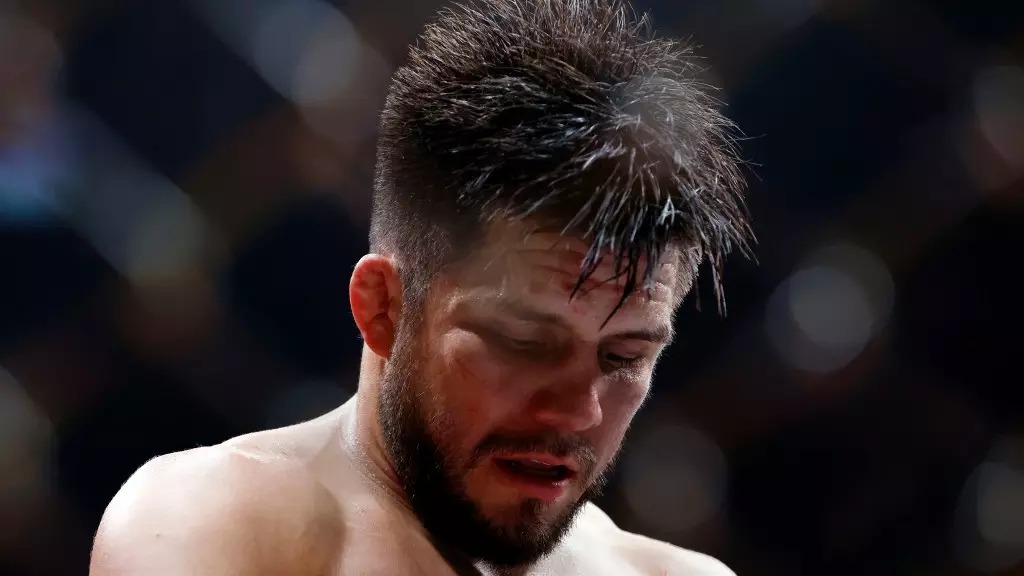Henry Cejudo, a celebrated mixed martial artist and two-division champion, is currently navigating treacherous waters following a deeply troubling eye injury sustained during his fight against Song Yadong at UFC Fight Night 253. The bout, which had the potential to be a defining moment in Cejudo’s career, ended controversially due to an eye poke, leading to a technically ruled decision that left Cejudo grappling not just with defeat but also with the harrowing implications of his injury.
During the fight, the action halted during the pivotal third round when Cejudo suffered an eye poke that necessitated a break. After a significant pause, he resumed fighting but was unable to emerge victorious, leaving him not only with a defeat on his record but also with lingering complications that challenge his ability to see clearly. Cejudo himself expressed the gravity of his condition, noting that he experiences double vision that can be particularly disorienting, especially when looking down or resting.
This injury, described by Cejudo as the most severe he has encountered in his career, raises pressing questions about the safety protocols in place within the sport. Why was there no point deduction for what many would consider a dangerous move? The circumstances surrounding the fight pose dilemmas about officiating in mixed martial arts, an issue that has garnered increased attention in the wake of Cejudo’s unfortunate experience.
A Shift in Perspective
Cejudo’s reflections on his eye injury reveal a dramatic pivot in how he views his career and its inherent risks. Initially, the athlete considered mixed martial arts a sport that, while demanding, did not harbor excessive danger. However, confronted with potential life-altering consequences, he is beginning to appreciate the risks that fighters face each time they step inside the octagon.
In candid remarks, Cejudo confided in MMA Junkie about his potential plans for retirement, suggesting that his current condition might compel him to conclude his fighting days soon. The heart of a competitive athlete is often resistant to surrender, yet Cejudo’s prioritization of his health over accolades signifies a mature, responsible shift in focus. His desire to prioritize quality time with his children over the thrill of combat illustrates a need for balance following a career defined by high-stakes bouts.
Additionally, Cejudo’s acknowledgment that he’s contemplating his last fight demonstrates a broader narrative within sports: at what point do the risks outweigh the rewards? This quandary is particularly pronounced in combat sports, where fighters are often lauded for their toughness but must wrestle with the long-term consequences of their choices.
Seeking Accountability and Justice
The aftermath of the fight has seen Cejudo pursuing legal action aimed at holding the referees and authorities responsible for mishandling the situation. Specifically, he has initiated an appeal with the Washington State Department of Licensing, which reflects a growing trend among athletes advocating for safer practices and accountability in their respective sports.
While some may view this move as a knee-jerk reaction borne of frustration, it speaks to a larger issue at play: the safety of fighters and fairness in officiating. Cejudo’s desire to overturn the decision to no contest instead of accepting defeat gracefully adds layers to his narrative, revealing how grappling with injury can lead to a quest for justice, particularly in a sport that continues to evolve in terms of policy and oversight.
Quality of Life Over Legacy
In a sport where legacy often fuels the drive for competition, Cejudo’s current contemplation exemplifies a radical honesty about the bodily toll that fighting exacts. While many fighters are celebrated for their willingness to endure pain, Cejudo’s current stance is a reminder that the thrill of the fight should never come at the expense of one’s health and well-being.
This situation beckons advocates of mixed martial arts to rethink the conversation around health risks, endorsing practices that prioritize the safety of athletes above the desire for entertainment. Cejudo’s reflections emphasize the critical need for dialogue around the implications of injuries, not just in the moment but in terms of a fighter’s overall life trajectory.
As Cejudo evaluates his future in the realm of mixed martial arts, he may set a precedent; being a champion is not solely about holding titles but also about ensuring fighters can live to enjoy their post-fighting years without debilitating injuries. In this light, the sacrifices athletes make to entertain us should be met with an equally robust commitment to their safety and health.

